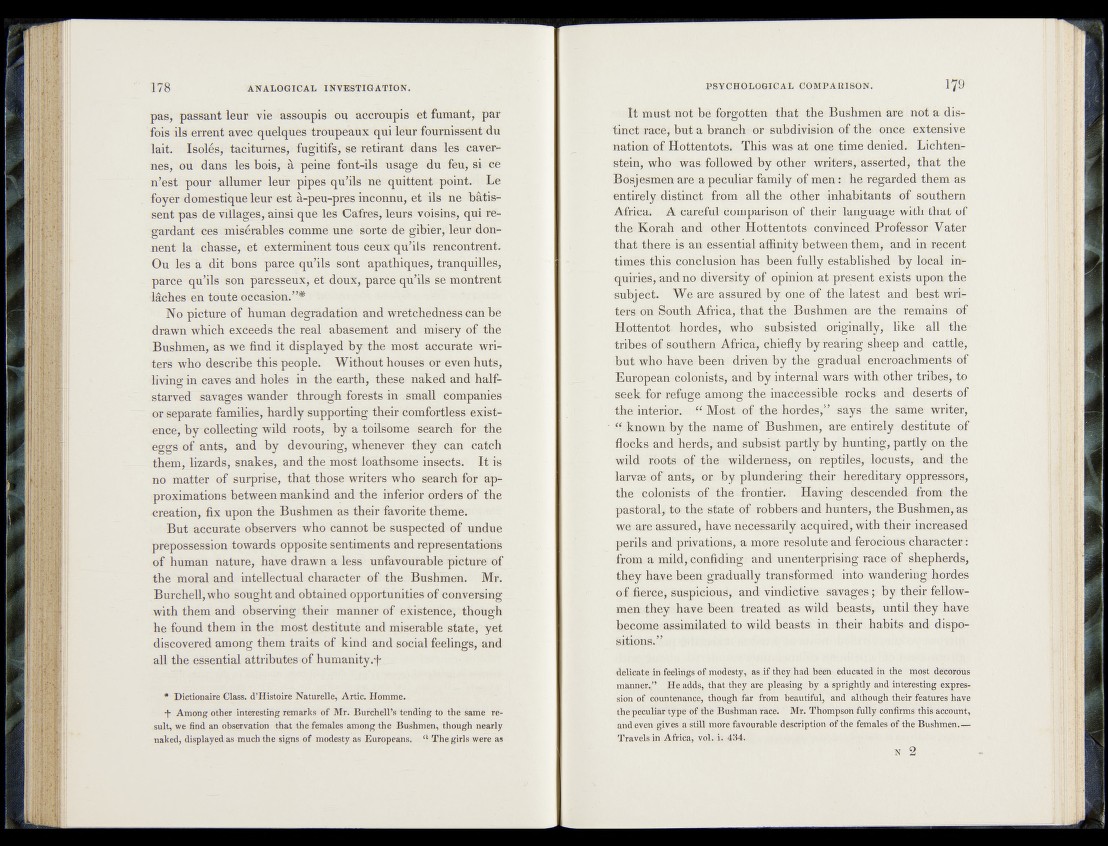
pas, passant leur vie assoupis ou accroupis et fumant, par
fois ils errent avec quelques troupeaux qui leur fournissent du
lait. Isolés/ taciturnes, fugitifs, se retirant dans les cavernes,
ou dans les bois, à peine font-ils usage du feu, si ce
n’est pour allumer leur pipes qu’ils ne quittent point. Le
foyer domestique leur est à-peu-pres inconnu, et ils ne bâtissent
pas de villages, ainsi que les Cafres, leurs voisins, qui regardant
ces misérables eomme une sorte de gibier, leur donnent
la chasse, et exterminent tous ceux qu’ils rencontrent.
Ou les à dit bons parce qu’ils sont apathiques, tranquilles,
parce qu’ils son paresseux, et doux, parce qu’ils se montrent
lâches en toute occasion.”*
No picture of human degradation and wretchedness can be
drawn which exceeds the real abasement and misery of the
Bushmen, as we find it displayed by the most accurate writers
who describe this people. Without houses or even huts,
living in caves and holes in the earth, these naked and half-
starved savages wander through forests in .small companies
or separate families, hardly supporting their comfortless existence,
by collecting wild roots, by a toilsome search' for the
eggs of ants, and by devouring, whenever they can catch
them, lizards, snakes, and the most loathsome insects. It is
no matter of surprise, that those writers who search for approximations
between mankind and the inferior orders of the
creation, fix upon the Bushmen as their favorite theme.
But accurate observers who cannot be suspected of undue
prepossession towards opposite sentiments and representations
of human nature, have drawn a less unfavourable picture of
the moral and intellectual character of the Bushmen. Mr.
Burehell,who sought and obtained opportunities of conversing
with them and observing their manner of existence, though
he found them in the most destitute and miserable state, yet
discovered among them traits of kind and social feelings, and
all the essential attributes of humanity .f
* Dictionaire Glass. d’Histoire Naturelle, Artie. Homme,
f Among other interesting remarks of Mr. Burchell’s tending to the same result,
we find an observation that the females among the Bushmen, though nearly
naked, displayed as much the signs of modesty as Europeans. The girls were as
It must not bë forgotten! that the Bushmen are not a distinct
race, b u ta branch: or subdivision of the' once extensive
nation of Hottentots« ïbàsi was at one time denied* Lichtenstein,
who was followed by other writers, asserted, that the
Bosjesmens are a peculiar family of men : he regarded them as
entirely distinct from all the néhèr ^inhabitants of southern
Africa» A earefukdomparkon of their language with that of
the Korah and other Hottuntotg; convineêd, Professor Vater
that there is an essential affinity between them, and in recent
times this conclusion has been fully established by local inquiries,
and no diversity of opinion at present exists upon the
subject. We are assured by one of .the latest and .best writers
afi -ikmtb.. Africa, ,that the Brashméu> ure the remains öf
Hottentot hordes, who subsisted originally, like all the
tribes of southern Africa, chiefly byreârihgsheep and cattïë,
but who have been driven by the gradual encroachments of
European Colonists, and by internal wars with other tribes,, to
sffiigfc for -refuge among the inaccessible rocks' and deserts of
the interior. “ Most of the hordes,” says the sdme writer,
-<f known by the name of Bushmen, are entirely destitute of
flocks and herds/ and subsist partly by hunting, partly on the
wild foots of th e wilderness, on reptiles, locusts, and th p
larvæ of' ants, or by plundering their hereditary oppressors,
the colonists of the frontier. Having deseendedfrom the
pastoral, to the-sfefete of robfeersmnd hunters, the Bushmen, as
we .are assured, have necessarily; acquired, with their increased
perils and privations, a more resolute and ferocious character :
from a mild, confiding and unenterprising race of shepherds,
they have been gradually transformed into' wandering hordes
of fierce, suspicious, and vindictive savages; by their fellow-
men they have been treated as wild beasts, until they have
become assimilated to wild beasts ktitheir habits and dispositions.”
delicate in feelings of modesty, as if they had been educated in the most decorous
manner.” He adds, that they are pleasing by a sprightly and interesting expres-,
sion of countenance, though far from beautiful, and although their* features have
the peculiar type of the Bushman race. Mr. Thompson fully confirms this account,
and even gives a still more favourable description of the females of the Bushmen.—
Travels in Africa, vol» -1» 434.